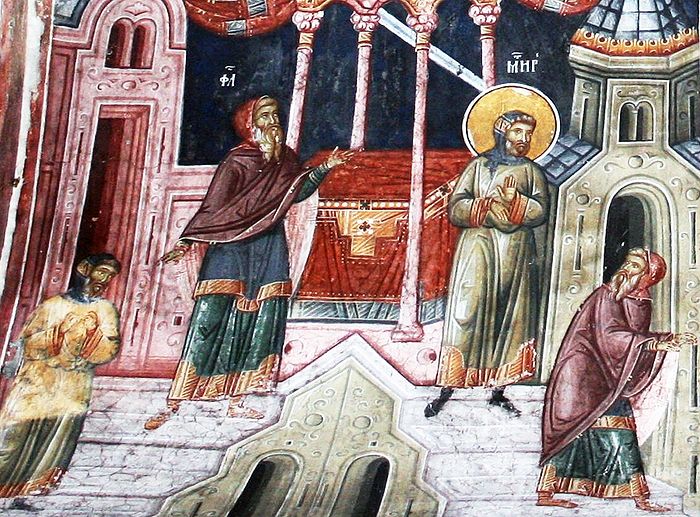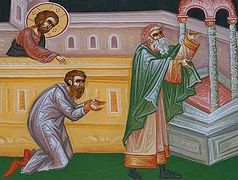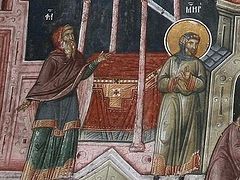When a person gets sick, loses his mind, and his reason is darkened, this sickness can be seen in the things he does that are abnormal or unnatural for a person of his age and station. It’s especially apparent in the things that he says. This is one of the signs that a person has lost his mind, become spiritually and mentally ill. Such people for example present themselves as someone else: One thinks he is a king, another, a famous astronaut, yet another insists that he possesses a secret plan and must immediately get access to very important people to tell them about it. Another tells others that unknown people are continually sneaking into his apartment and searching it, cracking the locks, moving things around or stealing them. There are many forms of emotional illness and they are well known to the psychiatrists who treat such people.
What mentally ill people say evokes surprise, often laughter among people around them, but grief among their family and friends. Those people are sick and say absurd things—mad, weird, inappropriate, or frightening things. This goes on for years. These people are sent to special institutions. It was the same in antiquity, they were isolated from the world, from contact with others so that that they would not do something even more crazy; but now they are treated with various methods in special medical wards. Often entire lives are spent like this, and people go on saying “words of madness”, revealing their terrible illness.
But there are also sicknesses that come up in spiritual life, about which the Lord is reminding us today in the parable of the publican and the Pharisee (cf. Lk. 18:10–14). These illnesses are no less terrible, but unfortunately not as obvious to us all. Andrew of Crete, a saint, writer, and poet, calls them words of madness. In the canon he wrote[1] we hear of how the Pharisee, praying in the temple, praised his own righteousness, saying, “I fast two days in the week, and a give tenth of my property”, and other words of madness. St. Andrew of Crete truly and clearly discerns this state, and the Holy, catholic Church discerns it in his voice.
Coming to the temple the Pharisee prayed to the Lord, but that prayer more resembled one long doxology to his own self. He thanked the Lord that he was not a sinner like all the rest; like that publican who stood not far from him, a tax collector who was mixed up in dirty business—money, bribes, extortion, humiliation, and oppressing his neighbor.
And this Pharisee considered himself better, without a doubt. After all, he observes the fasts and does everything to fulfill the Law of God. And that is what he thanks the Lord for.
At the same time the publican standing nearby said nothing of the kind, because he knew what a sinner he was; he didn’t even dare to lift up his eyes and only beat his breast, saying, “Have mercy on me, O Lord!”
The Lord says that the publican left more justified from the temple. His prayer was heard, as opposed to the prayer of the Pharisee. This mad, self-satisfied state is the most terrible state in spiritual life that could possibly be imagined. It is even worse that the state of falling into some kind of sin about which the sinner later repents. It stands in the way of our salvation and doesn’t allow God to come closer to us. This leaven of the Pharisees acts in all people and can bring forth just such frightening fruits.
We as Christians, who call ourselves such, can in very fact deny Christ and crucify Him by our lives, as the Pharisees did. What did these men who knew the Law do in the final analysis? They did not accept Christ, they did not want to listen to Him, they condemned Him, slandered Him, spat upon Him and crucified Him. When we hear about all this it seems to us that we are talking about people who lived some time long ago, but in fact we are talking about ourselves.
These two men live in each of us: the self-complacent Pharisee and the repentant publican who weeps over his sins. It often happens that these dispositions trade places in us—at one time we repent, asking the Lord only that He forgive us our sins, without thinking in the least about our ephemeral accomplishments in spiritual life. While at other times we stop and become complacent, considering that we live in such a way that we are guaranteed salvation, and not like those filthy, impious sinners who live around us.
This is in fact the most terrible, most horrifying state. It is just as mad in God’s eyes as the words and deeds of the emotionally and mentally ill are in our eyes. Our words of madness, which we so often say to the Lord, look just as terrible and monstrous, maybe even more terrible and monstrous to Him.
Therefore the Church as a spiritual hospital offers this parable to us today, in order to remember this and sober us once again at the threshold of Great Lent—that wonderful and grace-filled time prepared for the healing of our spiritual illnesses.
The main thing is to recognize this sickness, to see it in ourselves, and with resolve to struggle against it to cast off our self-satisfaction and false complacency, to set out upon the path of purification and correction, calling out to the Lord, “O Lord, have mercy on me a sinner!”




